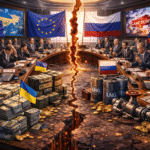The European Union, in collaboration with the United Kingdom, has announced its 18th sanctions package targeting the Russian Federation. This latest round of measures is designed to further constrain Russia’s financial capacity to sustain its military operations in Ukraine.
At the core of the new package is the implementation of a “floating oil price cap”, which sets the ceiling for Russian oil exports at 15% below the global average market price. This mechanism aims to reduce Moscow’s revenue from energy exports—one of its primary sources of funding for the war.
In addition to energy restrictions, the EU has expanded its blacklist to include 105 vessels associated with Russia’s so-called “shadow fleet”—ships used to covertly transport oil and circumvent previous sanctions. These vessels are now banned from operating under EU jurisdiction.
In a move that broadens the scope of enforcement, the sanctions also extend to Chinese financial institutions found to be assisting Russia in evading international restrictions. These banks will now face asset freezes and operational limitations within the EU, signaling a tougher stance on third-party involvement.
European officials emphasized that the package is intended to strengthen existing sanctions, close enforcement gaps, and reinforce the EU’s commitment to holding Russia accountable. The measures reflect a growing convergence between Brussels and London on adopting a coordinated approach to economic pressure.
The inclusion of foreign banks—particularly from China—marks a significant shift in Western sanctions strategy, expanding its focus beyond Russia to include global entities enabling circumvention.
The EU reiterated its unwavering support for Ukraine’s sovereignty, pledging to continue identifying and implementing additional measures aimed at isolating Russia from global financial and energy markets.








